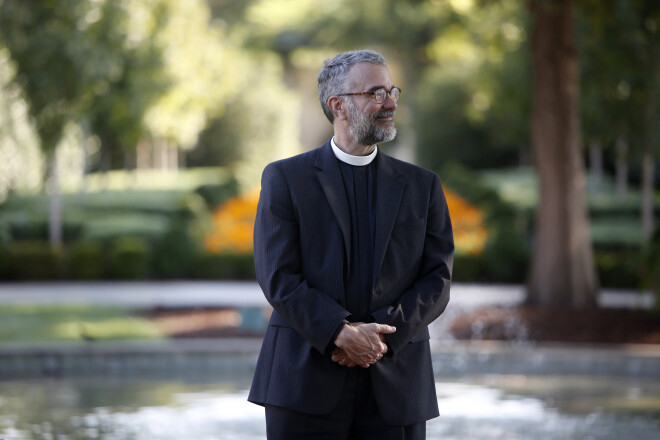Substitution?

How do newcomers get to the Episcopal Church? Maybe someone friendly when they visited, or the beauty of the liturgy, or the desire for roots in something ancient. Sometimes a Catholic with a Presbyterian spouse finds her or her own ‘middle way.’ For some in our context they are trying to make sense of their own conservative Protestant background.
It is in the context of the latter reason that I recently had a conversation with a thoughtful member of our diocese. She had been reading Tom Wright, with his questions about the individualist account of redemption and heaven she had grown up with, as well as his stress on the kingdom coming to the whole world on account of Jesus’ resurrection. Wright asks good questions, and one can see how they would inform her own. But she went on to wonder about the whole idea of substitution. Isn’t the idea that Jesus paid some account owning to a demanding God so that I can get to heaven just what Wright to helping us move beyond?
This question is more important than whether you are a Baptist or an Episcopalian. One way to answer the question is to think about one of the most influential books of theology in the 20th century. The Swedish Lutheran Bishop Gustav Aulen wrote a book about the atonement (Jesus’ work on our account) called Christus Victor. It has been much criticized, but for our purposes it is useful. Aulen says there are three ways to think about what Jesus did for us on the cross: first, that he won a victory over our enemy (Satan, the powers and principalities). The second answer he gives is called ‘satisfaction’: Jesus makes right what we owe. The third answer is that of the moral example: Jesus’ self-giving inspires contrition and love in us. (A great deal of what we hear in preaching in our time and church would fall under the third rubric).
There is much we could say about these three. There is a great deal of victory talk in the New Testament, though the victory model assumes we are victims only, and not also perpetrators of our predicament. The third, moral example, type leaves the onus on us, to change, to improve, which doesn’t alone sound like good news. Perhaps victory is what Jesus does, satisfaction is how he does it, and moral improvement is a hoped-for result.
Back to my main point: in both the victory and the satisfaction models, Jesus does something we could not do for ourselves. That is the first thing to say. Furthermore, if you probe further, you realize that He wins the victory by taking on death, and not any death but one that suffering the result of our alienation from God. (the early Church Fathers even talk of baiting a hook to catch Satan on by submitting Himself to this). In other words, in both the victory and the satisfaction ways of talking about the cross of Jesus, He stands in our place. He dies because we will, He suffers because we deserve to; Paul does so far as to say, amazingly, that he ‘became sin who knew no sin.’
The long and short of the matter is this: there are different ways to talk of what Jesus did for us. You can find a variety in the New Testament. You may have felt that an exclusive use of the image of paying a debt, or of being acquitted in a law court, such as you heard in another denomination, was too limiting. Fair enough. But also be clear that any account of Jesus’ work involves His doing what we can’t, And His dying in our place and suffering in our stead. Whatever language you use, being-in-our-place is substitution, ‘for us and our salvation.’ This is not Baptist, or Catholic, or Episcopal, but Christian. And his doing so, his dying in my place, makes it possible for you and me to live in His, by grace.
Peace, GRS



